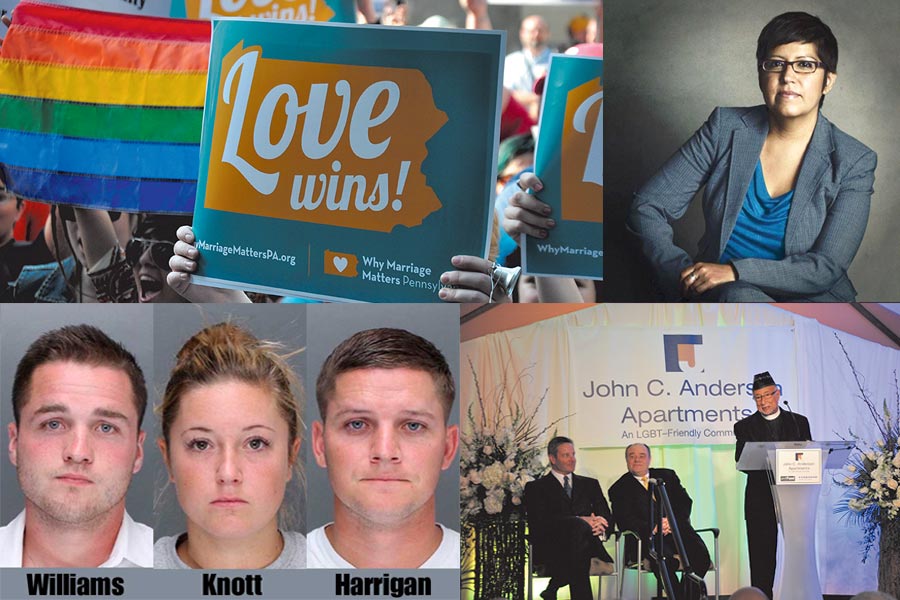In PGN’s “Top Stories” recap last year, we reveled in 2013 being the best year yet for marriage equality. Little did we know that an astounding 19 new states would sanction same-sex marriage in 2014, including Pennsylvania. While legal opinions and subsequent wedding bells topped the LGBT news cycle this past year,
there was a wealth of other LGBT headlines — some good, some bad — that are setting up this coming year to be another newsmaker.
MOMENTOUS MARRIAGE MOVEMENT
Pennsylvania welcomes marriage equality
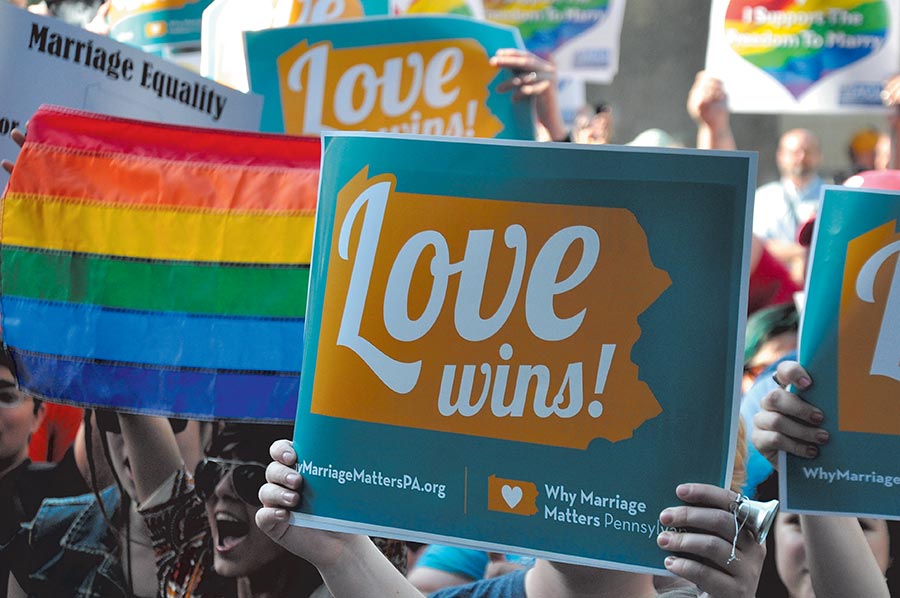
On May 20, Pennsylvania became the 19th state to legalize same-sex marriage.
That afternoon, U.S. District Court Judge John E. Jones 3d handed down a ruling striking the state’s ban on same-sex marriage as unconstitutional in a case brought by the American Civil Liberties Union and Hangley, Aronchick, Segal, Pudlin & Schiller. Jones said the law, in place since 1996, should be relegated to the “ash heap of history.”
Within hours, hundreds flocked to Philadelphia City Hall to celebrate, and 18 picked up marriage licenses from the city clerk, including Philadelphia Commission on Human Relations director Rue Landau and partner Kerry Smith, who were the first to obtain a marriage license in Philadelphia, and are believed to be the first in the state. But, for the first 24 hours, there was strong speculation that the celebration could be short-lived — until the following afternoon, when Republican Gov. Tom Corbett, an opponent of same-sex marriage, announced he would not appeal the ruling.
Couples who picked up licenses May 20 were able to begin marrying three days later. In the interim, clerk’s offices around the state were packed with same-sex couples applying for licenses, including at the Philadelphia Register of Wills Office, where 20 applied in just the first hour-and-a-half of business the day after the ruling. Local businesses sent food for couples waiting in long lines.
At midnight May 23, one couple was married on the steps of the Philadelphia Museum of Art, and a host of couples were joined in an emotional mass wedding later that day officiated by local judges in Philadelphia City Hall.
In the coming weeks, same-sex weddings were performed in local churches, at Love Park and even during the Philadelphia Pride Parade. Within the first month of marriage equality in Pennsylvania, 230 same-sex couples received marriage licenses in Philadelphia.
Legal wrangling for PA marriage
The path to marriage equality in the Keystone State was not an easy one.
After the U.S. Supreme Court decision in the summer of 2013 that overturned the federal ban on same-sex marriage, a number of lawsuits were filed in Pennsylvania to strike the state’s law.
Whitewood v. Corbett ultimately brought marriage equality to Pennsylvania. The case was slated to go to trial June 9, but in early April, attorneys for the plaintiff couples and for the state agreed to petition the court to rule on the briefs presented in the case, rather than trial testimony.
In the interim, antigay litigant James Schneller attempted to intervene to defend the state law in the Whitewood case, as well as in several other marriage-equality cases, and was denied in each. A group of antigay lawmakers also sought to include an amicus brief in the Whitewood case, urging the court to uphold the ban on same-sex marriage.
In Montgomery County, a group of same-sex couples who received marriage licenses from Register of Wills D. Bruce Hanes in 2013 continued their suit against the state this year. A judge in January dismissed Corbett and Attorney General Kathleen Kane as defendants, leaving Health Secretary Michael Wolf as the sole defendant. Following the May decision, negotiations continue in the Ballen v. Wolf case. Also in January, Cara Palladino and Isabelle Barker asked a judge for summary judgment on their request for the state to immediately recognize their out-of-state marriage. That case remains pending until all Whitewood appeals are resolved.
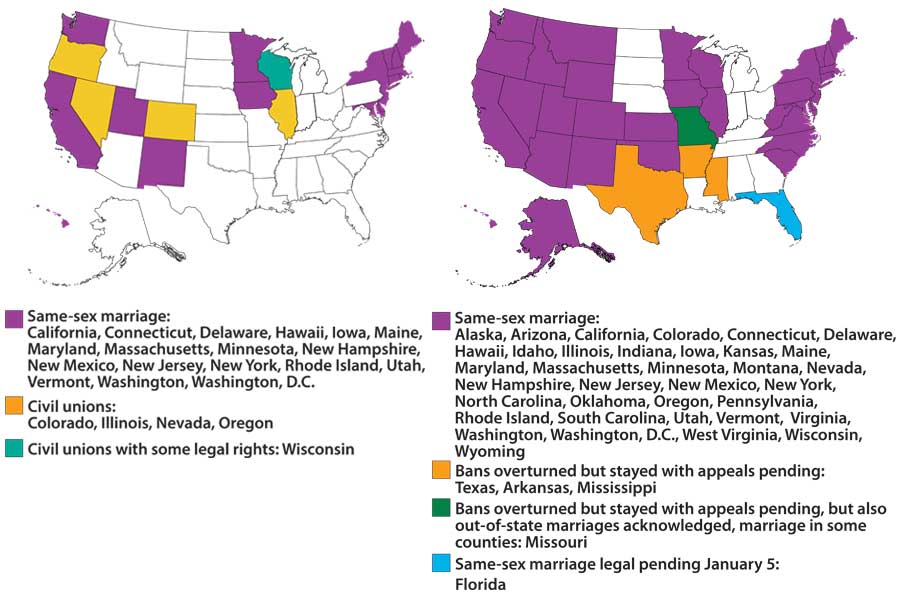
Fallout from PA marriage
The legal landscape for same-sex couples was transformed overnight when marriage equality became legal in Pennsylvania.
With the ruling, same-sex couples were granted access to the full gamut of marriage rights: insurance, health care, parenting, exemptions from inheritance and real-estate taxes and myriad other issues.
But the change wasn’t universally embraced immediately. A number of Pennsylvania establishments — including a reception venue and bridal-dress shop — turned away same-sex couples who were planning weddings under the new law; and, without a statewide LGBT-inclusive nondiscrimination law, there was little recourse. After a union impasse, it took SEPTA until August to recognize same-sex marriages of union workers.
And a clerk in Schuylkill County tried to put a halt to the entire practice of same-sex marriages in the state. Theresa Santai-Gaffney sought to gain standing to appeal the ruling, a bid denied by a three-judge panel of the Third Circuit. Antigay litigant James Schneller has also sought standing to appeal.
Marriage equality explodes across the nation
Same-sex marriage saw unprecedented growth in 2014: Marriage equality is now sanctioned in 35 states and Washington, D.C. — a total of 19 new states this year.
Federal judges in Oregon and Pennsylvania struck down their state’s marriage bans on May 19 and 20, respectively, and Illinois’ law was enacted through legislative action June 1. Then, on Oct. 6, the U.S. Supreme Court declined to take any of the pending marriage-equality cases before it — allowing federal appellate decisions that had found a number of bans to be unconstitutional to stand and to pave the way for others to follow suit. Within one week of the SCOTUS decision, marriage equality had come to nine new states, and several more followed over the ensuing weeks.
Rulings overturning same-sex-marriage bans are now on hold in five states.
As of presstime, more than 64 percent of the American population lives in a jurisdiction that allows same-sex marriage.
PA ruling highlights lack of other laws
When Pennsylvania legalized same-sex marriage, it ended its distinction of being the only state in the Northeast without marriage equality, but took on another unwelcome epithet: the only state with marriage equality, but without a law banning discrimination based on sexual orientation. At the time, two other marriage-equality states had laws preventing discrimination based on sexual orientation but not gender identity.
With the influx of other states legalizing same-sex marriage in the subsequent months, a number of jurisdictions are now in the same position.
But same-sex marriage in Pennsylvania fueled conversation on the state’s stalled nondiscrimination legislation.
“The interesting thing is that the marriage decision has made nondiscrimination a lot more real for people,” said Equality PA executive director Ted Martin. “You can be fired for putting your wedding picture on your desk at work. That has really hit home for folks.”
The state legislative session ended without movement on HB and SB 300. The House bill had 97 cosponsors and the Senate version had 26.
FIGHT FOR JUSTICE
Hate crime sparks outcry
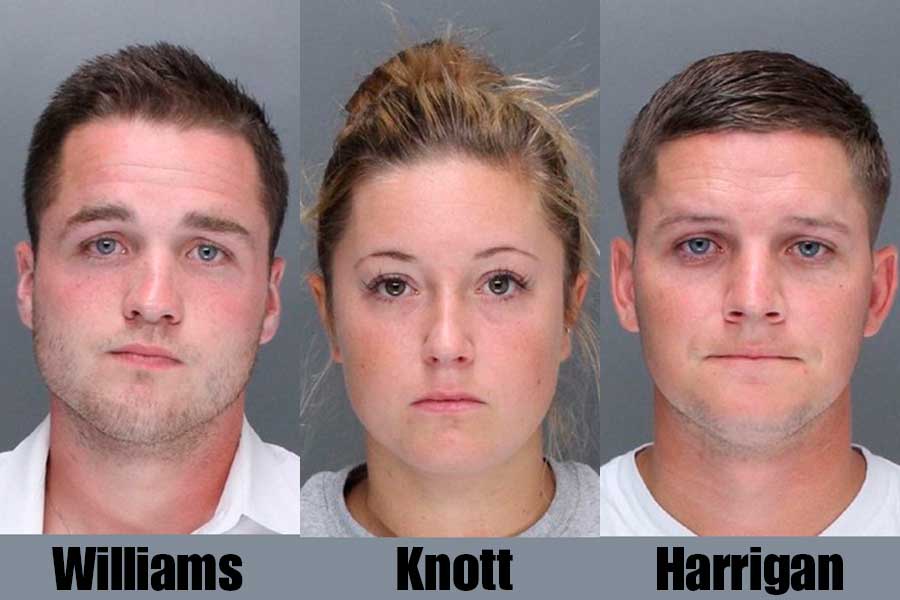
A Center City gay-bashing in September brought a harsh spotlight to the lack of LGBT hate-crimes protections in Pennsylvania.
A local gay couple on their way to dinner was beaten Sept. 11 by a group of people walking by, in an incident that appeared to have been sparked by the couple’s sexual orientation. The attack sparked a manhunt for the assailants via social media, and a local Twitter user was credited with identifying the suspects.
On Sept. 24, Kathryn Knott, Kevin Harrigan and Philip Williams were arrested and released on bail the following day. A judge last week upheld all charges against the trio — aggravated assault, simple assault, recklessly endangering another person and criminal conspiracy — and ordered them to stand trial.
Reaction to the assault was swift and vast. An October rally drew hundreds to Love Park, and efforts quickly got underway to amend local and state law. However, state lawmakers only managed to get an LGBT-inclusive hate-crimes bill out of the Senate Judiciary Committee, but the bill was never called to a vote.
In Philadelphia, Council members did as much as was legally possible to punish offenders of LGBT hate crimes that occur within city borders by passing a bill that instated a fine and jail time for crimes motivated by a victim’s sexual orientation, gender identity or disability, factors not covered by state law.
Police instate new trans policy
The Philadelphia Police Department took a big step forward this year to ensure transgender and gender-nonconforming citizens were treated respectfully by implementing a new directive that instructed personnel on how to properly interact with them.
Led by LGBT Liaison Deputy Commissioner Kevin Bethel, the initiative includes comprehensive guidelines that cover everything from interacting with trans victims, witnesses or suspects to communicating information about trans people to the media.
Most importantly, the policy instructs officers to ask the individual his or her preferred name and pronoun usage.
The directive also incorporated definitions and terminology applicable to the transgender community that mandated officers cannot question an individual solely based on his or her gender presentation and cannot use derogatory language.
“The overall aim is to make sure we establish a policy regarding interaction with transgender individuals where people are treated properly, with the courtesy and dignity they’re supposed to be treated with, as human beings,” said police spokesperson Lt. John Stanford.
Methodist minister fights defrocking
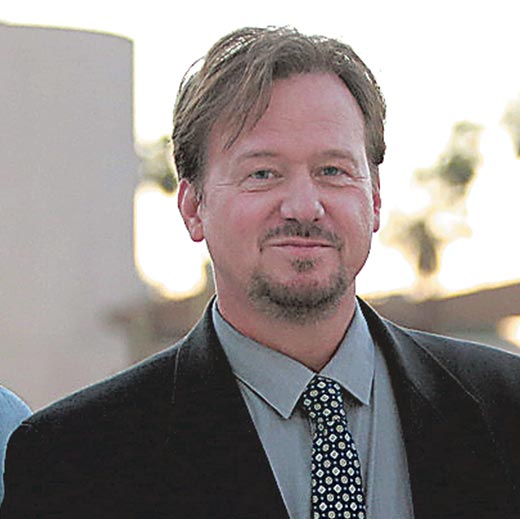
A local Methodist minister who was defrocked for officiating his son’s 2007 same-sex wedding successfully appealed the church’s decision this year.
In June, the Committee on Appeals for the Northeast jurisdiction ordered the Rev. Frank Schaefer immediately reinstated, with back pay and benefits retroactive to his Dec. 19, 2013, stripping of ministerial credentials.
“This is very encouraging news for everybody,” Schaefer said in praise of the appeals committee’s decision. “It’s definitely a big step in achieving LGBT equality within the church. And a big step towards ending the exclusionary policies within the church. However, there’s still a lot of work to do.”
The church appealed his reinstatement, but the highest judicial body in October upheld the ruling.
Following a complaint made six years after he officiated his son’s wedding, Schaefer was dismissed from his position at the Zion United Methodist Church of Iona in Lebanon, Pa., and defrocked after he refused to pledge not to officiate another same-sex wedding.
Schaefer has since relocated to a university community in Santa Barbara, Calif.
Diamond Williams’ murderer found competent
The man charged with the brutal murder of Diamond Williams, a transgender woman, was, after much delay, found to be mentally competent enough to proceed with a preliminary hearing — a small victory for advocates after a string of high-profile unsolved transgender murders in Philadelphia.
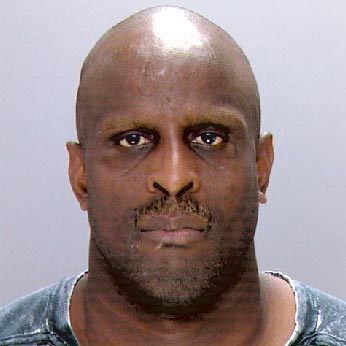
Charles Sargent, 44, is charged with murdering Williams in July 2013, in a house on the 2100 block of North 32nd Street.
A preliminary hearing had been postponed several times due to concerns about Sargent’s mental capacity. A pre-trial conference scheduled for this month was delayed to early next year.
Williams and Sargent, who were reported to have a sexual relationship, got into an argument, prompting Sargent to stab Williams, according to investigators. Sargent reportedly has said the fight stemmed from Williams’ status as transgender. After the stabbing, he allegedly dismembered Williams and dumped her remains in an empty lot between York and Sedgely streets.
Fight continues for Nizah records
Twelve years after the homicide of local transgender woman, Nizah Morris, PGN continued its quest for complete records about the case.
Morris was given a Center City “courtesy ride” by Officer Elizabeth Skala on Dec. 22, 2002, and was found with a fatal head wound shortly after.
A number of new agencies this year joined the call for state officials to launch a probe into the investigation.
This month, Philadelphia Common Pleas Court issued a scheduling order in PGN’s open-records request for complete dispatch records for a vehicle stop Skala initiated on the night in question. Oral arguments are expected to be held after May 4.
Earlier this year, the city prevented the Police Advisory Commission from releasing some key interviews, and this summer, PGN was prevented from viewing the full Internal Affairs investigatory file.
An event marking the 12th anniversary of Morris’ death was held Dec. 22, in which supporters placed candles outside D.A. Seth Williams’ office, with whom they are requesting a meeting.
COMMUNITY
Mourning the loss of Gloria Casarez
Philadelphia lost one of its strongest leaders this year.
Gloria Casarez, the city’s director of LGBT affairs, died Oct. 19, more than five years after being diagnosed with cancer. She was 42.
Casarez oversaw the city’s Office of LGBT Affairs since 2008, having previously served as executive director of Gay and Lesbian Latino AIDS Education Initiative. During her tenure, Philadelphia was named to the top of the Human Rights Campaign’s Municipal Equality Index, which rates American cities for their LGBT policies and programs. She played a key role in legislation like the overhaul of the city’s Fair Practices Ordinance, the measure that mandated some city contractors offer domestic-partner benefits and the landmark 2013 LGBT-rights bill, which offered local companies first-in-the-nation tax credits for pro-LGBT policies and instated a number of trans-related city reforms.
Casarez led the establishment of the Mayor’s Advisory Board on LGBT Affairs, was responsible for the raising of the rainbow flag each October outside City Hall and also worked with the Philadelphia School District to launch an LGBT resource guide for city schools. She sat on a number of local boards and served as both a formal and an informal mentor and resource for people across the LGBT and ally communities.
Casarez was diagnosed with cancer in 2009, but never wavered from her work in the last five years.
“She was a complete warrior on every level,” said wife Tricia Dressel.
The day after she died, the city lowered the rainbow flag outside City Hall to half-mast and, a few days later, local business and organizations covered their doors and windows with rainbows as Casarez’s funeral procession moved through the Gayborhood.
State senator comes out
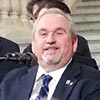
State lawmaker Sen. Jim Ferlo (D-38th Dist.) made headlines this year when he unexpectedly came out as gay in a Harrisburg press conference that sought to garner support for expanded hate-crimes legislation in the wake of the Philadelphia gay-bashing incident.
Ferlo, a three-term senator who retired at the end of this legislative session, is the first openly gay state senator in Pennsylvania.
He and other state lawmakers and members of the community at the October rally sought to build support for House Bill 177 and Senate Bill 42, which would expand hate-crimes language in the state law to include LGBT individuals.
Ferlo said he wanted to use the opportunity to personalize the situation for his Republican colleagues and “demonstrate that this issue affects all Pennsylvanians.”
Ferlo has led the effort to pass LGBT-inclusive hate-crimes legislation every year since 2007, when it was declared unconstitutional by a state court.
Giovanni’s Room changes hands, name
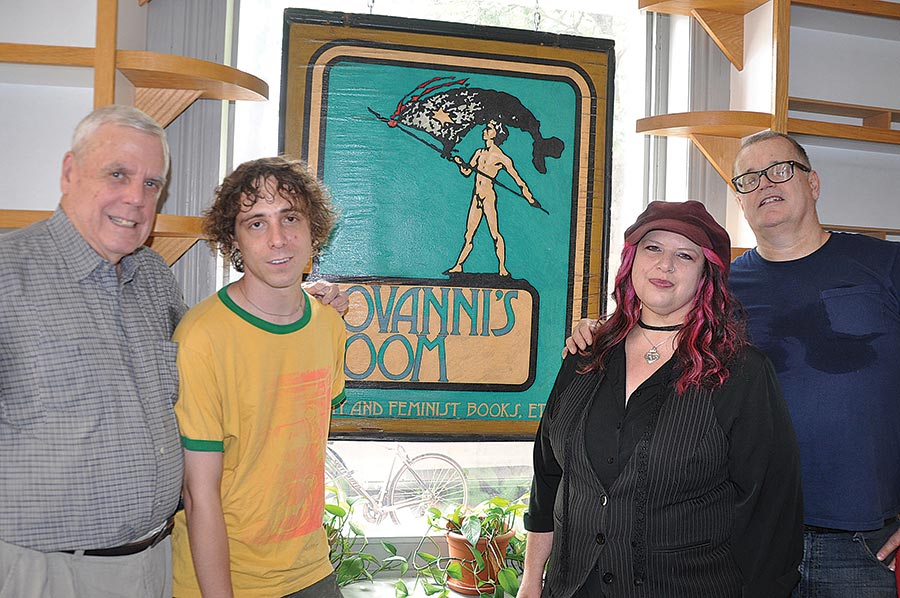
This year saw a lengthy waiting game for news on the future of the nation’s oldest LGBT bookstore.
Giovanni’s Room founder and owner Ed Hermance, who started the business in 1976, announced last year that he was retiring and selling the business. But, unable to find a buyer, Hermance closed the store May 17. However, over the summer, Hermance ironed out a deal with Philadelphia AIDS Thrift, which signed a two-year lease Aug. 16.
The store was slated to stock $15,000 worth of LGBT-centric books, about 2,000 titles, as well as items such as clothing, jewelry and small furniture.
Philly AIDS Thrift @ Giovanni’s Room had a soft opening the following month and a grand-opening celebration OutFest weekend.
Hermance told PGN he anticipated the new venture to be a success.
“We’ve been struggling for so long and I think Philly AIDS Thrift has a real chance of turning it around and making it profitable again.”
Corbett ousted by Wolf
Perhaps LGBT Pennsylvania’s biggest political victory this year was the ousting of Republican Gov. Tom Corbett in favor of Democratic opponent Tom Wolf.
While Corbett ultimately decided not to appeal the federal court ruling legalizing marriage equality, his “support” did not go much further than there, with the exception of coming out this year in favor of the LGBT nondiscrimination law and backing the John C. Anderson LGBT-friendly senior apartments, for which he approved funding. He had previously made offensive remarks comparing same-sex unions to incestuous relationships, and did not take steps to move forward the nondiscrimination or hate-crimes measures. He was also blasted for cutting General Assistance funding, which impacted people with HIV/AIDS.
Wolf, on the opposite end of the spectrum, has expressed strong support for all LGBT issues throughout his entire campaign, pledging to both uphold and advance LGBT equality in Pennsylvania.
Also of note was out Republican state legislator Mike Fleck’s loss in the primary and general elections. Fleck was the only out Republican state lawmaker and made headlines for coming out in his rural conservative district in 2012.
After coming out, Fleck lost the Republican primary but ended up running a successful write-in campaign on the Democratic ticket. While a victory could have signified changing times within the Republican Party and its stance on LGBT issues, he ultimately lost his seat in November, despite having been reelected three times previously.
Philly celebrates milestone Pride
The Philadelphia Pride celebration was extra-festive this year, coming just three weeks after Pennsylvania legalized same-sex marriage.
Event organizers estimated more than 16,000 people turned out for the June 7 festivities, the largest crowd record in the event’s 26-year history.
While the stellar weather likely attracted some attendees, organizers surmised that headliners The Village People and then-recent marriage legalization generated much of the unprecedented numbers.
“With marriage equality in the state, people had even more of a reason to celebrate,” said Philly Pride Presents executive director Franny Price.
The marriage-equality milestone was marked with a mass wedding of a dozen same-sex couples before the parade judges’ stand on Market Street, officiated by out Court of Common Pleas Judges Dan Anders and Ann Butchart.
